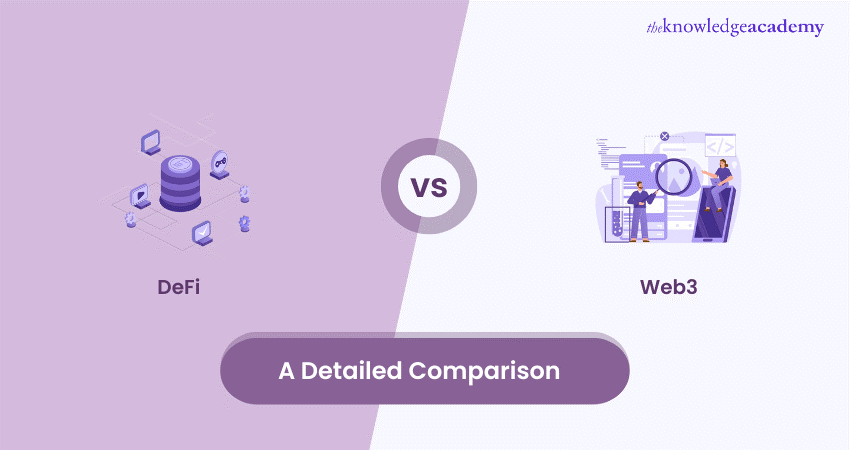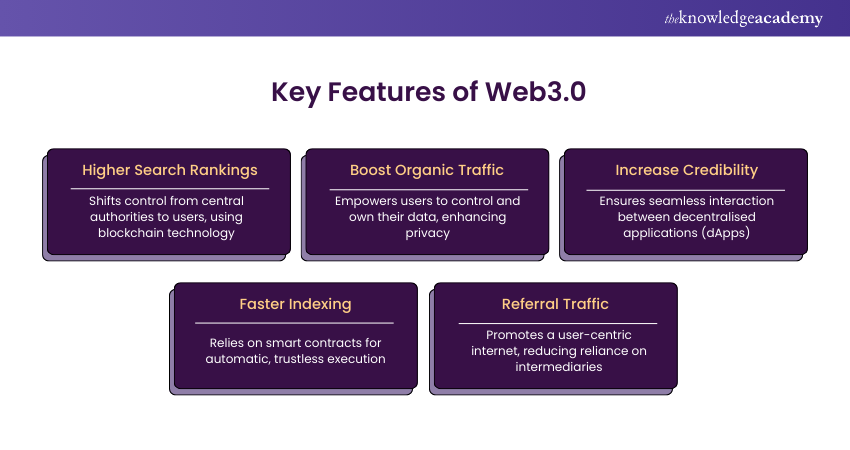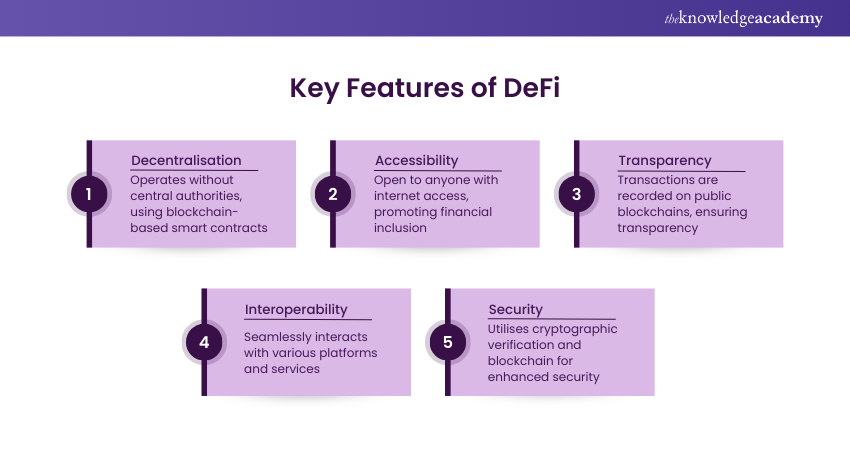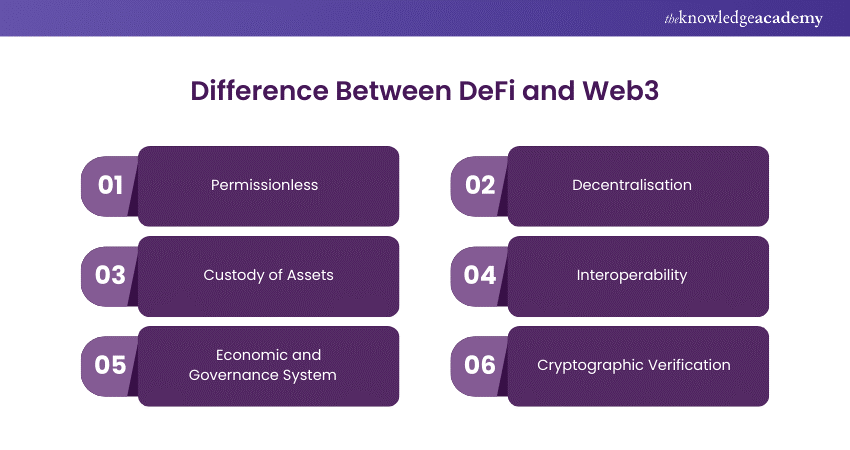We may not have the course you’re looking for. If you enquire or give us a call on +852 2592 5349 and speak to our training experts, we may still be able to help with your training requirements.
Training Outcomes Within Your Budget!
We ensure quality, budget-alignment, and timely delivery by our expert instructors.

Are you curious about what lies ahead for the Internet and finance? Meet DeFi and Web3, the advanced concepts revolutionising our digital landscape. Web3 visualise a decentralised web where users regain complete control. DeFi transforms finance, providing services without traditional banks. Both rely on Blockchain Technology, ensuring transparency and security. Let’s discover how DeFi vs Web3 technologies are changing our digital world.
They empower individuals, encourage diversity, and fuel innovation. DeFi and Web3 are making this a reality, reshaping the digital universe. In this blog, we’ll explore the differences between DeFi vs Web3, examining their unique features. In addition to this, know their impact on online interactions.
Table of Contents
1) What is Web3?
2) What is DeFi?
3) Difference Between DeFi and Web3
4) Future of DeFi and Web3
5) Conclusion
What is Web3?
Web3 is the next big thing on the Internet. It moves ahead of the current centralised model. Unlike conventional Web 2.0, where power lies in the hands of financial institutions, Web3 aims to build a decentralised web. This new technology relies on Blockchain Technology, Smart Contracts, and decentralised applications (dApps).

It focuses on user satisfaction, privacy, and data ownership, shifting control from corporations to individuals. This shift promises a more democratic and transparent Internet, where users have more power over their digital identities and data.
What is DeFi?
Decentralised Finance (DeFi), a key component of Web3 technology, seeks to transform the financial sector fundamentally. DeFi uses Blockchain Technology to craft a transparent, constentless financial system without intermediaries. Traditional financial services like lending, borrowing, and trading are reproduced using Smart Contracts on Blockchain Networks.

DeFi aims to offer financial services to individuals with an Internet connection, promoting financial inclusion and reducing reliance on conventional banking institutions. It’s a vital component of the broader Web3 vision, which emphasises democratising finance.
Advance your career with our Web3 Professional Certification Training Course – Register now!
Difference Between DeFi and Web3
Let’s explore the distinctions between DeFi and Web3 and understand how each contributes to the decentralised digital landscape.

1) Permissionless
Web3 and DeFi function rely on the principle of non-consent, yet they apply it in distinctive ways. Web3 includes a comprehensive range, such as decentralised applications (dApps) and protocols, guaranteeing open access and involvement. Everyone can join these platforms without requiring permission.
DeFi utilises this open-access feature for financial services, enabling users to partake in lending, borrowing, and trading without intermediaries. This inclusiveness displays a significant change from conventional systems that typically impose restrictions on access.
2) Decentralisation
Decentralisation is a fundamental principle in Web3 and DeFi, manifesting uniquely. Web3 seeks to remove control from central authorities, decentralising the Internet ecosystem, including social networks and cloud storage. DeFi aims to decentralise the financial industry by replacing conventional banks with decentralised platforms controlled by Smart Contracts.
These agreements automatically perform transactions, promoting transparency and reducing the possibility of fraud. DeFi's decentralisation ensures financial services are accessible to everyone, promoting innovation and competition.
3) Custody of Assets
In Web3, users retain control over their digital identities and data, ensuring privacy and security. This self-sovereignty is a core principle of Web3, empowering users to handle their online presence independently of centralised entities. DeFi stretches this concept to financial assets, enabling users to hold and manage their funds directly through decentralised Web3 Wallets .
These wallets engage with intelligent contracts, facilitating various financial activities without intermediaries. This self-custody minimises reliance on traditional banks and enhances security.
4) Interoperability
Interoperability is vital in Web3 and DeFi, facilitating smooth communication among various platforms and protocols. Web3 emphasises building a connected environment for apps and services to interact and work collectively. Through interoperability, enhanced user experience (UX) and innovation are encouraged across the decentralised web.
DeFi platforms also value interoperability, enabling users to transfer assets and data seamlessly between various financial protocols. This interconnectivity promotes a more inclusive and efficient financial system by narrowing the gap between traditional and decentralised finance.
Unlock the future of finance with our Bitcoin and Cryptocurrency Course – Sign up now!
5) Economic and Governance System
Web3 and DeFi introduce novel economic and governance structures, giving users more power and promoting community-driven growth. In Web3, Decentralised Autonomous Organisations (DAOs) empower users to participate in collective decision-making by voting on proposals and shaping the platform's trajectory. This method of democracy ensures that power is shared among individuals, minimising the control of central figures.
DeFi platforms also use comparable governance structures, allowing token holders to participate in decision-making for changes and enhancements. This interactive model of governance promotes openness and brings together users' and developers' aim.
6) Cryptographic Verification
Cryptographic verification is essential in Web3 and DeFi, guaranteeing security and trust in decentralised systems. Web3 utilises cryptographic methods to safeguard user information and confirm transactions, improving confidentiality and preventing unauthorised entry. This security layer is essential for building trust in decentralised applications and services.
DeFi uses cryptographic verification to protect financial transactions and Smart Contracts, minimising the chances of fraud and hacking. This strong security structure supports DeFi's decentralised and unreliable aspect, allowing users to participate in financial activities with confidence.
Future of DeFi and Web3
The future of DeFi and Web3 is both promising and transformative. As technology evolves, decentralised systems are expected to become more user-friendly, accessible, and seamlessly integrated into our daily lives.
Web3 aims to revolutionise the Internet by creating a more democratic and transparent online environment where users have control over their data and digital identities. This shift promises a new era of digital autonomy and privacy.DeFi, on the other hand, is set to disrupt the traditional financial sector by offering open, accessible, and efficient financial services worldwide. As it matures, DeFi could lead to a more inclusive financial system where traditional banking barriers are removed.
Both DeFi and Web3 are poised to drive significant innovation, influencing how we interact with technology and finance in the future. Their continued development will likely shape the digital landscape, making the Internet and financial systems more equitable and decentralised.
Conclusion
We hope you understand the difference between DeFi vs Web3. Both Web3 and DeFi play an essential role when it comes to reshaping the financial system. It creates a decentralised atmosphere across the Internet and empowers users with ownership. The users can easily access the permissionless ecosystem. In short, they promise a democratic, inclusive, and secure digital future for all of us.
Learn to develop an App or Website with our App & Web Development Training - Join now!
Frequently Asked Questions

DeFi and Web 3.0 offer a transparent and open service. It removes the intermediaries to boost security via blockchain. Both technologies foster innovative solutions globally.

It is done through decentralised wallets like Trust Wallet and MetaMask. The wallet can be connected to these platforms to facilitate borrowing, lending, and trading.

Some of the challenges the Web3 market faces are regulatory uncertainties, user adoption barriers, and scalability issues. In the absence of clear guidelines, these can impact growth.

The Knowledge Academy takes global learning to new heights, offering over 30,000 online courses across 490+ locations in 220 countries. This expansive reach ensures accessibility and convenience for learners worldwide.
Alongside our diverse Online Course Catalogue, encompassing 17 major categories, we go the extra mile by providing a plethora of free educational Online Resources like News updates, Blogs, videos, webinars, and interview questions. Tailoring learning experiences further, professionals can maximise value with customisable Course Bundles of TKA.

The Knowledge Academy’s Knowledge Pass, a prepaid voucher, adds another layer of flexibility, allowing course bookings over a 12-month period. Join us on a journey where education knows no bounds.

The Knowledge Academy offers various App & Web Development Training, including the Web3 Professional Certification Training Course, and Web3 Professional Certification Training Course in Virtual. These courses cater to different skill levels and provide comprehensive insights into What is Bitcoin Blockchain.
Our Programming & DevOps Blogs cover a range of topics related to Blockchain, offering valuable resources, best practices, and industry insights. Whether you are a beginner or looking to advance your Programming & DevOps Skills, The Knowledge Academy's diverse courses and informative blogs have got you covered.
Upcoming Programming & DevOps Resources Batches & Dates
Date
 Web3 Professional Certification Training Course
Web3 Professional Certification Training Course
Fri 24th Jan 2025
Fri 21st Mar 2025
Fri 2nd May 2025
Fri 27th Jun 2025
Fri 29th Aug 2025
Fri 3rd Oct 2025
Fri 5th Dec 2025







 Top Rated Course
Top Rated Course



 If you wish to make any changes to your course, please
If you wish to make any changes to your course, please


